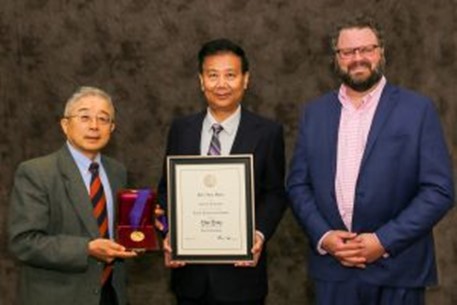
Yiqi Yang is the 2021 recipient of the American Association of Textile Chemists and Colorists (AATCC) Olney Medal for outstanding achievement in textile science. Yang is being recognized for his work on the research and development of sustainable, greener textiles. He received the medal from friend and previous Olney recipient Gang Sun at the AATCC Textile Discovery Summit in Charlotte, NC, USA (www.aatcc.org/summit).
Yang’s contributions to textile science include the development of new biobased fibers and textile chemicals from agricultural wastes and co-products, and cleaner productions in coloration and finishing. His pioneering research on new biofibers such as 100% protein fibers from poultry feathers, and stereo-complexed PLA fiber with excellent resistance to hydrolysis during high temperature textile processes are examples of his work.
A prolific researcher, Yang spent his career in the Midwest, working with farming communities to take what would be considered unusable waste and transforming it into a clean, sustainable, usable product. Take, for instance, chicken feathers—Yang, along with his collaborators, found a way to transform this large waste product into textile fibers that can be incorporated into fabrics. Yang and his team were able to perform cross-linking using saccharide aldehydes. By modifying the molecular structure and concentration of these aldehydes, they created keratin fibers that were found to be stronger than any other keratin-based fibers. Not only do the keratin fibers from feathers show great promise in holding their strength in fabric when immersed in water or when dry, they also “have excellent dyeability and colorfastness with acid dyes.”1
Yang’s research has also uncovered a way to create plastics that are biodegradable through plant-based alternatives found in the textiles and materials industry. Yang and his lab began to collaborate with researchers from Jiangnan University in China in the early 2000s on this concept. Through their research, they discovered that polylactic acid or polylactide, found in cornstarch and other plants, is a more environmentally friendly alternative to petroleum-based plastics. By heating the plastic with polylactide to a higher degree and allowing it to cool slowly, the researchers learned that the plastic was more durable in hot or cold temperatures, making it more suitable for the textile and materials industry.
Throughout his career, Yang has worked with his students and collaborators to find ways to create a more “sustainable and environmentally responsible textile industry.” His research in agricultural products and co-products have had far-reaching impacts locally, nationally, and internationally
 TEXTILES.ORG
TEXTILES.ORG


